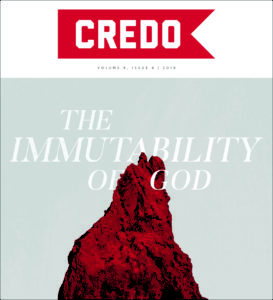Too many Christians have a view of God’s love like a girl picking petals off a daisy, saying, “He loves me…. He loves me not!” If God’s love did change with our conduct and circumstances, then God would be riding a gut-wrenching roller-coaster of love. Nothing could be farther from the truth. If we are in Christ, then God’s love for us is unchanging. This is one facet of the sparkling diamond we call God’s immutability, which means God cannot change.
Clarifying What We Mean
God has a general love for all his creations (Ps. 145:9), but when we speak of God’s unchanging love, we do not mean that God accepts all people (John 3:18, 36), or that he has unlimited patience with the unrepentant (Rom. 2:4–5). The Lord can withdraw the mercies of his general love (Isa. 9:17; Ezek. 7:4, 9; Hos. 9:15), and send sinners to hell forever (Matt. 25:41, 46).
We also should understand that God’s love for his elect people is not eternal justification, or indifference toward our faith and obedience. As long as people remain in unbelief they are “children of wrath”; even if God chose them before he created the world, their spiritual state is the same as “the rest of mankind” (Eph. 1:4; 2:3). Furthermore, the Lord Jesus said that when we love God and keep his commandments, he has pleasure in our works with what theologians call his love of “complacency” or delight (John 14:21, 23; Heb. 13:21).
What do we mean, then, by God’s unchanging love? God has an infinite, eternal, unconditional love for his chosen people in Christ. His love is infinite, greater than we can measure or understand (Ps. 103:11; Eph. 3:19), which God demonstrated by giving the gift of infinite value: “his only begotten Son” (John 3:16 KJV). His love is eternal (Ps. 103:15–17). His love is unconditional, giving the best good to those who do not deserve the least good (Rom. 5:8; Eph. 2:4–5; 1 John 4:10). John Owen said that God’s love always comes first: “It goes not only before our love, but also any thing in us that is lovely”; he loves us “not because we are better than others, but because [he] himself is infinitely good.”[1]
Therefore, God loves his chosen people with an ardent, unchanging kindness. Since his love is infinite, he cannot love us more, and he will never love us less. Since his love is eternal, it is not subject to time and its variations. And since his love is unconditional, it does not change when we change, but springs from the bottomless wells of his own glory. Amazing love!
Why We Need to Know His Unchanging Love
Someone might object, “All this theology is interesting, but what difference does it make?” Knowing God’s unchanging love can make a great difference in our lives, for several reasons. Insofar as it penetrates our hearts, the knowledge of God’s unchanging love enables us:
1. To Know the True God.
The doctrine of God’s unchanging love reveals God’s divine nature. God’s love for the people he redeemed in Christ is not just something that he does. “God is love” (1 John 4:8). If God’s love for us fluctuates, then God’s very being changes. Christ made this amazing statement when praying to his Father for his people: “You sent me and loved them even as you loved me” (John 17:23). Therefore, the better we know his unchanging love for us, the better we know the eternal love of the Father for the Son in the holy Trinity. The better we know his unchanging love for us, the better we know the eternal love of the Father for the Son in the holy Trinity. Click To Tweet
2. To Rest Confidently in the Lord.
The immutability of God’s love shows us the certainty of God’s promise. The Lord says, “For the mountains may depart and the hills be removed, but my steadfast love shall not depart from you, and my covenant of peace shall not be removed” (Isa. 54:10). Stephen Charnock paraphrases, “The heaven and earth shall sooner fall asunder, and the strongest and firmest parts of creation crumble to dust, sooner than one iota of my covenant shall fail.”[2] This makes God’s people secure. God says, “For I the Lord do not change; therefore you, O children of Jacob, are not consumed” (Mal. 3:6).
3. To Find Comfort in Life’s Changes.
We face the instability of God’s fallen creation. People whom we love die. Everything in this world will be shaken (Heb. 12:26). We may be tempted to think that God has forgotten us (Ps. 13:1; Isa. 40:27). But the Lord says, “Can a woman forget her nursing child, that she should have no compassion on the son of her womb? Even these may forget, yet I will not forget you” (Isa. 49:15). Though disaster strikes, “the steadfast love of the Lord never ceases” (Lam. 3:22). James Ussher said that this gives “comfort unto the faithful, for the strength of their weak faith,” for “whom he loveth, to the end he loveth them.”[3]
4. To Imitate God in Our Love.
As children imitate the father who loves them, so Christians should imitate God’s love (Eph. 5:1). Most people’s love lasts no longer than the morning dew, but God desires “steadfast love” (Hos. 6:4, 6). The more we know God’s love, the more we will become faithful and true—like him (2 Cor. 1:17–18).
5. To Persevere in Our Troubles.
Christians face many troubles. We may slip into bondage and fear (Rom. 8:15). Our sorrows move us to “groan inwardly” (v. 23). Christians around the world experience distress, persecution, famine, exposure, danger, and death (v. 35). The doctrine of God’s unchanging love assures us: “Neither death nor life, nor angels nor rulers, nor things present nor things to come, nor powers, nor height nor depth, nor anything else in all creation, will be able to separate us from the love of God in Christ Jesus our Lord” (vv. 37–39).
Praise be to God for his immutable love! If you are a believer in Christ, then meditate on these things, and use them as fuel for your worship and daily walk with God. John Preston said, “When thou knowest that God is knit to thee by an unchangeable bond, that he is a friend whom thou mayest build upon forever, whom thou mayest trust; this makes thy heart to cleave to him.”[4]
And if you are not a Christian, don’t miss out on the greatest love. All that we have described will be yours if—and only if—you turn from your sins and trust in the Son of his love.
Endnotes
[1] John Owen, Communion with God, in The Works of John Owen, ed. William H. Goold (New York: Robert Carter & Brothers, 1851), 2:29.
[2] Stephen Charnock, The Existence and Attributes of God, in The Complete Works of Stephen Charnock, intro. James M‘Cosh (Edinburgh: James Nichol, 1864), 1:412–13.
[3] James Ussher, A Body of Divinity: Being the Sum and Substance of the Christian Religion, intro. Crawford Gribben (Birmingham, AL: Solid Ground, 2007), 2nd head (30).
[4] John Preston, Life Eternall, or, A Treatise of the Divine Essence and Attributes, 2nd ed. (London: by R. B., 1631), 2:88.
Image credit: Michael R. Jochem, Buehrle_VanGogh


